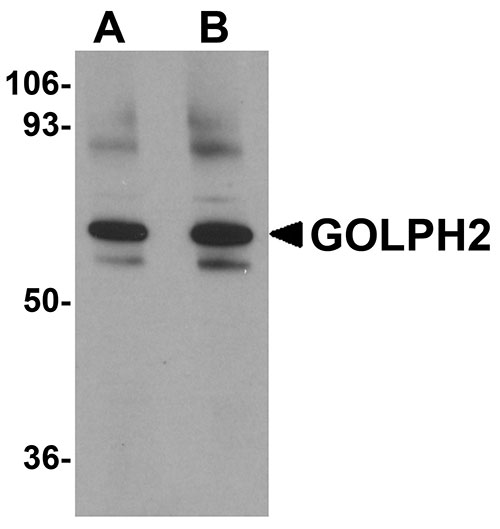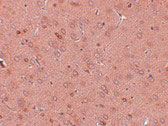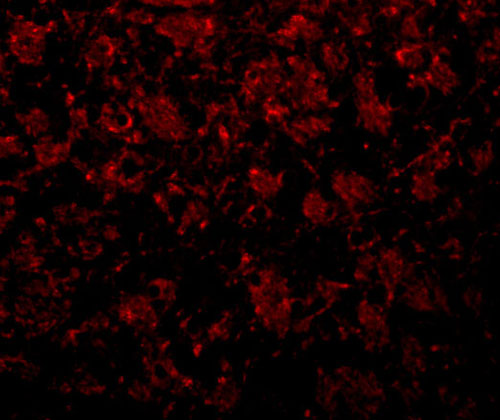GOLPH2 Antibody
- SPECIFICATION
- CITATIONS
- PROTOCOLS
- BACKGROUND

Application
| WB, IHC-P, IF, E |
|---|---|
| Primary Accession | Q8NBJ4 |
| Other Accession | EAW62705, 119583109 |
| Reactivity | Human, Mouse, Rat |
| Host | Rabbit |
| Clonality | Polyclonal |
| Isotype | IgG |
| Calculated MW | Predicted: 67 kDa Observed: 70 kDa |
| Application Notes | GOLPH2 antibody can be used for detection of GOLPH2 by Western blot at 0.25 - 0.5 µg/mL. Antibody can also be used for immunohistochemistry starting at 2.5 µg/mL. For immunofluorescence start at 20 µg/mL. |
| Gene ID | 51280 |
|---|---|
| Target/Specificity | GOLM1; |
| Reconstitution & Storage | GOLPH2 antibody can be stored at 4℃ for three months and -20℃, stable for up to one year. As with all antibodies care should be taken to avoid repeated freeze thaw cycles. Antibodies should not be exposed to prolonged high temperatures. |
| Precautions | GOLPH2 Antibody is for research use only and not for use in diagnostic or therapeutic procedures. |
| Name | GOLM1 |
|---|---|
| Synonyms | C9orf155, GOLPH2 |
| Function | Unknown. Cellular response protein to viral infection. |
| Cellular Location | Golgi apparatus, cis-Golgi network membrane; Single-pass type II membrane protein. Note=Early Golgi. Cycles via the cell surface and endosomes upon lumenal pH disruption |
| Tissue Location | Widely expressed. Highly expressed in colon, prostate, trachea and stomach. Expressed at lower level in testis, muscle, lymphoid tissues, white blood cells and spleen. Predominantly expressed by cells of the epithelial lineage. Expressed at low level in normal liver. Expression significantly increases in virus (HBV, HCV) infected liver. Expression does not increase in liver disease due to non-viral causes (alcohol-induced liver disease, autoimmune hepatitis) Increased expression in hepatocytes appears to be a general feature of advanced liver disease. In liver tissue from patients with adult giant- cell hepatitis (GCH), it is strongly expressed in hepatocytes-derived syncytial giant cells. Constitutively expressed by biliary epithelial cells but not by hepatocytes. |

Thousands of laboratories across the world have published research that depended on the performance of antibodies from Abcepta to advance their research. Check out links to articles that cite our products in major peer-reviewed journals, organized by research category.
info@abcepta.com, and receive a free "I Love Antibodies" mug.
Provided below are standard protocols that you may find useful for product applications.
Background
GOLPH2 Antibody: GOLPH2, also known as GOLM1, is a Golgi phosphoprotein that has a short cytoplasmic N-terminal domain, a membrane spanning region, and a longer C-terminal domain. It was initially identified as a possible marker for Alzheimer's disease, although later studies have demonstrated that the GOLPH2 gene does not contribute to risk of this disease. GOLPH2 expression has been reported higher in prostate cancer tissues compared to normal prostate tissue, suggesting that GOLPH2 can be used as an additional positive marker for tissue-based diagnosis of prostate cancer. It has been suggested that GOLPH2 expression in hepatocellular carcinomas (HCCs) and serum may also serve as tumor markers for HCCs.
References
Kladney RD, Bulla GA, Guo L, et al. GP73, a novel Golgi-localized protein upregulated by viral infection. Gene 2000; 249:53-65.
Li H, Wetten S, Li L, et al. Candidate single-nucleotide polymorphisms from a genomewide association study of Alzheimer disease. Arch. Neurol. 2008; 65:45-53.
Antunez C, Boada M, Lopez-Arrieta, et al. GOLPH2 gene markers are not associated with Alzheimer’s disease in a sample of the Spanish population. J. Alzheimers Dis. 2009; 18:751-4.
Kristiansen G, Fritzsche FR, Wassermann K, et al. GOLPH2 protein expression as a novel tissue biomarker for prostate cancer: implications for tissue-based diagnostics. Br. J. Cancer 2008; 99:939-48.
If you have used an Abcepta product and would like to share how it has performed, please click on the "Submit Review" button and provide the requested information. Our staff will examine and post your review and contact you if needed.
If you have any additional inquiries please email technical services at tech@abcepta.com.













 Foundational characteristics of cancer include proliferation, angiogenesis, migration, evasion of apoptosis, and cellular immortality. Find key markers for these cellular processes and antibodies to detect them.
Foundational characteristics of cancer include proliferation, angiogenesis, migration, evasion of apoptosis, and cellular immortality. Find key markers for these cellular processes and antibodies to detect them. The SUMOplot™ Analysis Program predicts and scores sumoylation sites in your protein. SUMOylation is a post-translational modification involved in various cellular processes, such as nuclear-cytosolic transport, transcriptional regulation, apoptosis, protein stability, response to stress, and progression through the cell cycle.
The SUMOplot™ Analysis Program predicts and scores sumoylation sites in your protein. SUMOylation is a post-translational modification involved in various cellular processes, such as nuclear-cytosolic transport, transcriptional regulation, apoptosis, protein stability, response to stress, and progression through the cell cycle. The Autophagy Receptor Motif Plotter predicts and scores autophagy receptor binding sites in your protein. Identifying proteins connected to this pathway is critical to understanding the role of autophagy in physiological as well as pathological processes such as development, differentiation, neurodegenerative diseases, stress, infection, and cancer.
The Autophagy Receptor Motif Plotter predicts and scores autophagy receptor binding sites in your protein. Identifying proteins connected to this pathway is critical to understanding the role of autophagy in physiological as well as pathological processes such as development, differentiation, neurodegenerative diseases, stress, infection, and cancer.




